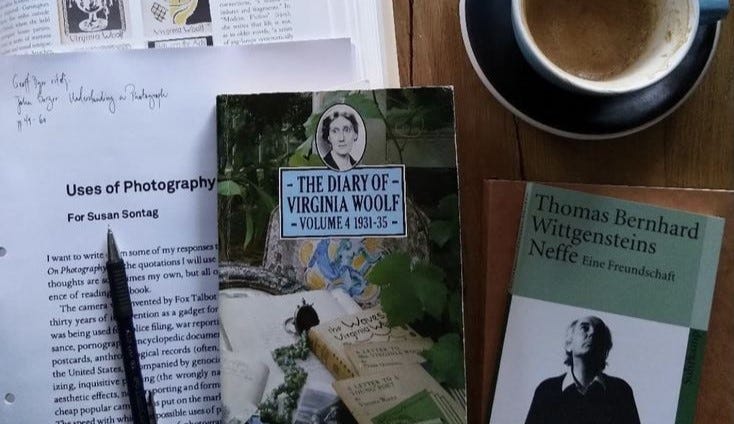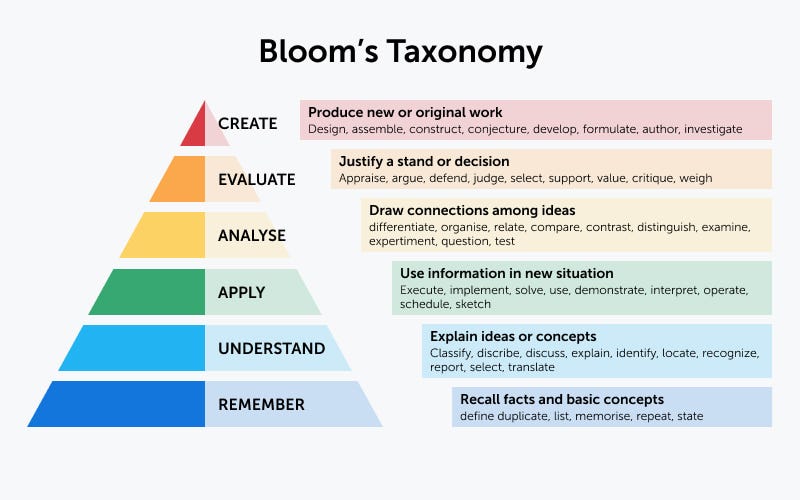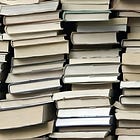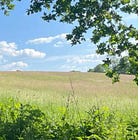Elizabeth Jean started the trend with her viral TikTok video showing her July curriculum, complete with units on baking cookies, reading memoirs, and studying manifestation. Now my entire feed is flooded with aesthetic study plans for "1960s French films" and "a complete read-through of Toni Morrison’s novels."
I love the newfound excitement for self-study. I've been doing something similar since college with my monthly syllabi, only recently publishing them here on Substack.
But though visually appealing and intellectually aspirational, many of the curricula I'm seeing don't plan for any concrete output: no essay to write, no project to complete, no question to answer.
Without a goal for output, they're just glorified reading lists. By month's end, what do you have to show for it? Highlighted passages? A completed checklist? A vague sense of enrichment?
In that sense, the monthly curriculum trend misses out on a core tenet of what makes learning an adventure: the act of creating something with what you've learned.
Don’t be an intellectual tourist: why creation matters more than consumption
“The core of a man’s spirit is his passion for adventure. The joy of life comes in our encounter with new experiences.” - Jon Krakauer
As I get older, the world shrinks, and my life becomes more predictable. When I was 16, everything counted as a “new experience”: driving to Wawa after school to buy my own snacks; heck, driving itself. Then at 18, leaving for college, and in my twenties, traveling the world. Then buying a house, trying to make a marriage work, getting a divorce, selling the house, getting a dog, and then traveling some more.
Now at twenty-nine, simply living no longer counts as an adventure. I’m not complaining; how satisfying it is to drive up to an obstacle in the road of life and be able to say, “Oh, I’ve seen this before, and I know how to get over it.” At the same time, I do agree with Krakauer that if our supply of new experiences comes to a standstill, so too does the joy of life.
Krakauer was a mountaineer as well as a writer, so I know what kind of “adventure” he was alluding to. But for those of us who love reading and learning, haven't we found our own treasured form of adventure? Every book contains a multitude. Every question we try to answer feeds that part of us that needs something new.
But there's a difference between tourism and exploration. Many monthly curriculums are just tourism, meaning a passive wandering through other people's ideas.
Consider Bloom’s taxonomy, an educational framework describing levels of learning as a pyramid. At the base: remembering and understanding (important, but still passive). Moving up: applying and analyzing. The peak is where the magic really happens (evaluation and creation) and where learning transforms into something tangible that you make all your own. This taxonomy is my blueprint for self-study.
Think about it this way: reading three books on the philosophy of mind will keep you at understanding. Writing your own position paper, building your case from those sources, allows for true engagement with the material. You've moved from being a spectator to being a participant in the intellectual conversation, and you have something to show for your efforts.
The same goes for watching cooking videos vs. developing your own recipe, or reading all of one author’s works vs. drafting a short story in their style.
Build your curriculum around a goal rather than a topic, and learning suddenly becomes an adventure.
My alternative: build around an output
Setting your sights on an output creates a sense of urgency. Here are a few concrete ways to do this:
Approach 1: Answer a Burning Question
My favorite. Choose a genuinely contentious question where experts disagree or there's no single answer, but you want to figure out where you personally stand.
Can men and women be just friends?
Does self-actualization exist?
What makes some children more successful in school than others?
I typically follow these steps:
Introductory reading to craft the right question
Gather evidence from multiple perspectives
Evaluate competing arguments
Formulate and defend your position
Document that position
Output: A 1,000-2,000 word essay staking your claim, backed by evidence. OR just come up with your answer, no writing required, and have it ready for when your weird uncle starts arguing with you at Thanksgiving.
Approach 2: Make Something Real
If your curriculum focuses on a skill or craft, the path is clearer:
Learning bookbinding? Rebind an actual book.
Studying poetry? Write poems in multiple styles you've studied.
Exploring cooking techniques? Host a dinner party featuring dishes that demonstrate each technique.
Output: A tangible creation that proves you've internalized the learning.
Approach 3: Teach What You've Learned
Inspired by the Feynman technique, transform your learning into something others can use:
Create a guide for beginners
Record a video essay
Design an infographic that clarifies complex concepts
Write a critical analysis that helps others understand the topic
Output: Educational content that demonstrates mastery through your ability to explain and clarify.
Real examples from my monthly syllabi*
I consider the month a success if I have an answer by the end, but I also write separate posts expounding on one or more concepts that I learned.
The question: Why did the existentialists write so many novels?
The syllabus:
Sartre's Nausea
Camus's The Plague
Kobo Abe's The Woman in the Dunes
Hermann Hesse's Steppenwolf
Supporting texts: Being and Nothingness, The Myth of Sisyphus, The Ethics of Ambiguity, online articles
What I created: Two analytical essays exploring key themes I discovered:
"Bad faith, contingency, and freedom": A deep reading of how objects function as the foil to human consciousness in Nausea, examining how each character represents a different form of existential evasion
"Were the Existentialists better at sex than me?": An exploration of why sex is such a recurring theme in existential literature, connecting physical intimacy to questions of authenticity, freedom, and the Other
The question: If everything is meaningless AND we don't have free will, how exactly are we supposed to live?
The syllabus (in progress):
Robert Sapolsky's Determined: A Science of Life Without Free Will
Galen Strawson's Freedom and Belief
Kurt Vonnegut's Slaughterhouse-Five
Viktor Frankl's Man's Search for Meaning
*A quick note on why I say “syllabus” instead of “curriculum”: I use "syllabus" rather than "curriculum" because a syllabus is focused, time-bound, and specific, with a clear objective and concrete endpoint. A curriculum is broad, long-term education. Multiple syllabi can of course build into a curriculum over time, but I like for each month to stand alone as its own complete project.
A brain dump of inspiration for your next self-study plan
Philosophy & Psychology:
Define what self-actualization means to you, and how you would know you had reached it.
Choose one Jungian archetype and apply it to analyze a novel or film; explain whether it clarifies the story or distorts it.
Read two Stoic texts and develop a 7-day plan for applying their principles to modern anxiety.
Compare philosophers’ and neuroscientists’ definitions of memory, and write your own working definition.
Read an existentialist novel and explain how it functions as philosophy in disguise; decide if it succeeds.
Culture & Society:
Gather 3 cultural definitions of “happiness” and create your own framework for what happiness means to you.
Compare 2–3 religious conceptions of the afterlife and write a reflection on what they reveal about human needs.
Trace the history of domestic service work in America and create a case study showing how it is changing today.
Study trickster myths from 2 cultures and explain what they suggest about morality and chaos.
Analyze 3 examples of successful social movements and argue which factor mattered most: messaging, timing, or leadership.
Science & Technology:
Read 2–3 explanations of climate models and write your own plain-language guide to how they work and where they fall short.
Compare examples of AI-generated and human art, then define the criteria you’d use to judge authenticity.
Research what makes a city “livable,” and write a design brief for your ideal neighborhood.
Study habit formation research and design a 30-day experiment to change one habit, documenting your process.
Conduct a micro-experiment (sleep, diet, productivity, etc.), analyze the results, and present your findings as a short report.
Arts & Creative Projects:
Read 3 utopian or dystopian novels and write a comparative essay on what they predict about society.
Design and host a dinner party where each dish represents a cooking technique you’ve studied.
Compose and record a 5-minute piece of music using free tools, and explain what choices shaped it.
Make a zine that curates poems, quotes, and commentary on one theme (grief, joy, revolution).
Build a visual timeline of one historical event and annotate it with primary sources and analysis.
Let’s ask more questions
Here's my challenge for your September curriculum: Don't just pick a theme. Pick a question that genuinely puzzles you.
Build your reading list around investigating that question from multiple angles. Then commit to producing something (i.e., an answer, an essay, a creation, a teaching tool) by month's end.
The monthly curriculum trend has the right idea: intentional, self-directed learning. But without that final step toward creation, you're missing the real adventure. When you commit to producing something concrete, you transform from consumer to creator, from student to scholar, from someone who learns to someone with agency.






I don't think we should be policing the way people want to learn. There's no right or wrong way to learn, everyone is different and has different capabilities and there shouldn't be standards set. This just creates a sense of superiority for people who are doing it your way, which defeats the point of this 'trend', and quite frankly comes across as very judgemental. I think it's great that adults are taking their own time to learn something new, no matter what format it looks like.
I love this idea. I’m good at the reading part, but have always been terrible at the creating part. Maybe it’s just a matter of forcing a question on myself, but this seems like a great solution to just being a spectator for your own intellectual journey.